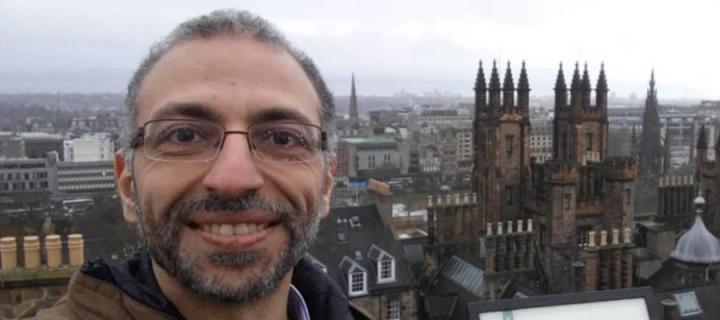Ahmed Hamam
Medical doctor Ahmed Hamam took a career break to pursue an MSc in Science and Religion. Over the year-long programme his peers became like a family during rigorous intellectual debates.
| Name | Ahmed Galal Hamam |
| Degree | MSc in Science and Religion |
| Year of Graduation | 2016 |
Your time at the University

I've been interested in the science and religion dialogue throughout my life. I've been looking for “scientific” answers and evidence for “religious” claims. After 15 years in my professional career as a doctor, I thought of a career break to pursue my passion.
Edinburgh was the first suggestion by Mr Google when I asked him about universities offering postgraduate studies in Science and Religion. Actually, there were about five or six universities in the whole world offering this course, and Edinburgh was the best and most expert.
In short, that year (2015-2016) was the best year in my life at all levels, academically, spiritually, socially and scientifically. It was a kind of transformation year. I have been exposed to new horizons in different aspects that have changed my way of thinking and looking to life - as if I have experienced a NEW dimension through which I can see new and exciting perspectives for what seems to be ordinary things.
For instance, for me and many others who are interested in the science and religion debate, this debate was about how science and religion view the same issue differently. But, in the University of Edinburgh, we have been taught to think in a philosophical way and ask deeper questions like: What do we mean by science and religion? What is the difference between "science" and "scientists' opinions", "religion" and "scholars' interpretations"? When we address questions like these, the whole science and religion debate looks different and it becomes harder to explore it! Harder and more exciting, indeed!
Throughout my career in medicine, I have known people from different cultures and backgrounds, but our shared interest was always a specific and focused aspect of an external life matter; i.e. medicine. On the other hand, Edinburgh's experience gifted me with the opportunity to explore the internal domain of my colleagues, and how they view different aspects of life and metaphysics. I enjoyed also being open to them and sharing with them how I think about different issues, without fear of being criticised. We were like a family!
In short, that year (2015-2016) was the best year in my life at all levels, academically, spiritually, socially and scientifically. It was a kind of transformation year.
Your experiences since leaving the University
I managed to get myself registered in the General Medical Council and I'm currently working in the NHS. I work as a specialty Doctor in Diagnostic Radiology. Radiology, as you may know, is about seeing the inside of our bodies, without being inside the body. So, we do not see a true picture of it, but a transformed picture through computers. Our mission is to interpret it to the nearest possible way to the truth. The ultimate truth is when the surgeon opens and sees with naked eyes what's going on. When I see my career through science and religion discourse, radiology becomes our attempts to investigate the evidence and proof for God’s existence, while surgery will be the afterlife experience!
I also brought my family here. Why? To stay in touch with my family in the School of Divinity. Whenever possible, I attend science and religion conferences where I see Dr Mark Harris and Dr Mike Fuller. One day, hopefully, I'll go back there for a PhD!
I am interested in how we - as Muslims - can deal with the Quran, scientifically. I have so many concerns regarding the Ijaaz school, in which the verses have to be twisted to fit a scientific fact or theory. But, I am interested in a deeper level, which is: can we deduce a model of interaction between science and religion, from the Quran? Is there any suggested or promoted methodology of how we should deal with science and religion debate, from the Quranic perspective? My masters dissertation was an initial step towards answering this question. I hope that I can do more work on it in the future when I go back there for a PhD.
Alumni wisdom
Invest every day and minute in building up yourself. Edinburgh is the best place to explore new horizons, not only in the external world, but within your inner world. Attend courses and activities by other schools, share in Edinburgh University Students' Association activities, and get in touch with friends from different countries, background and interests. Who knows? You might discover something new about yourself, something that might amaze you!
Related links
MSc in Science and Religion

